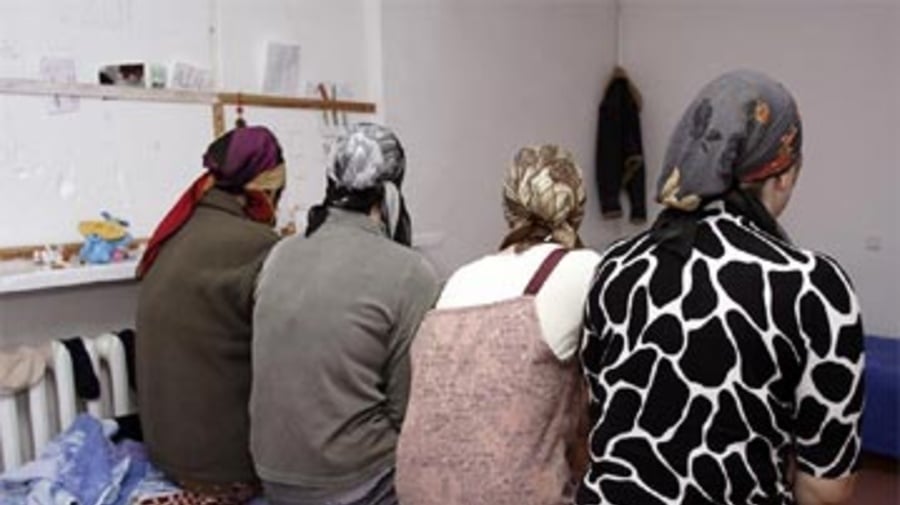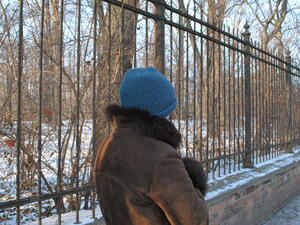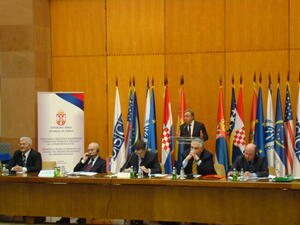For Chechens, Poland is not west enough
For Chechens, Poland is not west enough

Many Chechen asylum seekers, such as these four women, do not view Poland as their final destination – but the EU disagrees.
WARSAW, Poland, December 5 (UNHCR) - Shema drags her teenage daughter down the stairs together with the wheelchair. They live on the second floor of a reception centre for asylum seekers in Poland. There is no lift, so the tiny, grey-haired lady in her forties fights with the wheelchair twice a day, up and down the stairs, to get her daughter some fresh air.
"I have one dream: to get the girl on her feet," Shema says. "I know some people who had operations in other countries. I don't know why I can't go where I want, to treat my baby. I am stuck in Poland."
Shema believes that going west would solve all her problems. She does not listen to anyone with a different opinion. Not to doctors, who say the girl will never walk. Nor to fellow asylum seekers, who were sent back to Poland and tell her that the magic "West" is not the haven she dreams of. Nor even to non-governmental agencies (NGOs) which try to find simple solutions to make Shema's life easier - like moving the family to the ground floor.
There are thousands of Chechen asylum seekers in Poland who, like Shema, are convinced that Poland cannot help them. They are not interested in the modest possibilities that exist there, and are determined to seek a better life elsewhere.
Although the number of asylum seekers coming to Poland seems to be dropping - 5,900 by 25 November this year (down from totals of 6,900 in 2003 and 8,100 in 2004) - the percentage of Russians (the great majority of whom are Chechens) has increased from 81 percent of the total in 2003 to an anticipated 95 percent this year.
Although Poland has been a member of European Union for over a year now, Chechens do not think of the EU as starting here. Expecting more comprehensive assistance, they are quickly disappointed by the standards of Polish reception centres and by the limited integration possibilities.
The 16 Polish reception centres host nearly 3,500 asylum seekers, mainly Chechens who are citizens of the Russian Federation. They are provided with accommodation, basic health care, canteen food and some pocket money.
Despite its limited funding, the Polish Office for Repatriation and Aliens makes an effort to ensure conditions in the reception centre are adequate. But the asylum seekers still find plenty to complain about:
"We have only one washing machine for almost 100 people."
"The cockroaches are the fattest ones you have ever seen."
There is not enough sports equipment and too few playgrounds; no library, only one TV. Education facilities for the children are limited and the medical assistance is unsatisfactory - or so people say.
Still, for people fleeing violence and persecution, the centres undeniably offer safety. "The reason for so many complaints and frustrations is not really the conditions, but a lack of future perspectives," says Manana Anjaparidze, of Médecins Sans Frontières, who runs a psychological assistance project in Poland.
Only a small percentage of Chechens can count on acquiring full refugee status in Poland. Out of more than 8,200 individuals whose cases were processed between 1 January and 25 November 2005 (of whom probably more than 90 percent were Chechens), only 283 people were given refugee status. Another 1,631 individuals were granted 'tolerated stay' - the Polish name for subsidiary protection - and 2,114 were rejected. A further 4,212 people (51 percent of the total processed) had their cases terminated without a substantive decision.
Earning a living in Poland, even for those with settled legal status, can be extremely difficult for Chechen families, which tend to be large. In recent years, Poland has introduced integration programmes for recognized refugees in their first year. These include education and measures to help refugees integrate in the labour market.
But 'tolerated stay' - the status given to around 85 percent of those recognized to be in need of protection - provides its beneficiaries with almost nothing in the way of sustenance. Even though it does provide for a work permit, finding a job is extremely difficult in a country where 18 percent of the population is unemployed. In reality, many 'tolerated' foreigners find themselves homeless and jobless. Some even choose to re-enter the asylum procedure, just to be able to stay in the centres, while others head west.
Many Chechens leave without even waiting for the decision of the asylum authorities. More than half the cases dealt with between 1 January and 25 November this year were terminated - mainly because the applicants had disappeared from Poland.
"I'll be frank with you: I don't want to be here," Masha, a Chechen asylum seeker, says. "I want to have a new life, but here I have no hope. I was already in France - my kids went to school, everything was so good, but they sent me back." She is among the increasing number of people, who tried to leave Poland, but were returned under the Dublin II regulation. "I will try again," she says.
Under the Dublin II regulation, which came into force in February 2003, it is no longer possible for asylum seekers to choose the country where they apply for asylum. Now, they can file their asylum applications only once - in principle in the first EU country in which they set foot. For these Chechens, this is unwanted Poland.
Many Chechens are convinced that Dublin II is a Polish concept, and that it is Poland which seeks their return from other EU countries. Such misunderstandings, false beliefs and ungrounded suspicions add to tensions between asylum seekers and Polish social welfare staff.
Many Poles working with Chechen asylum seekers have got so accustomed to Chechens treating Poland as a transit country, that they sometimes fail to notice those who actually wish to stay. And there are some: a Chechen nurse, a Chechen doctor and a lawyer, some Chechen cooks - they all struggle, but they get by. Their children go to school. They make friends with Poles, and seduce them with Chechen food. Nowadays, a few Warsaw sweet shops are to be found selling delicious 'Chechen pastries.'
However, turning Poland into a destination country for Chechens requires more than a greater demand for cakes. So most Chechens decide to leave and look for a new life elsewhere. As the Dublin II regulation does not allow them to transit Poland on their way to other EU countries, they resort to smugglers. In 2004 alone, Polish border guards arrested 178 organized groups of smugglers. Their chief 'clients' were Russian citizens, many of them ethnic Chechens.
'Every week we receive several persons returned to Poland under Dublin II," says a border guard official at Warsaw's Okecie Airport. "We see an increasing number of people who are repeatedly returned - for a second or third time."
So, in search of the fabled West, many Chechens continue to play out an expensive and traumatic circular drama. They arrive in Poland and seek asylum. Then they pay for illegal transit westwards, are picked up and deported back to Poland. They return to the same centres from where they once fled, escape again, get caught, are deported once more....
By Agnieszka Kosowicz in Warsaw, Poland





